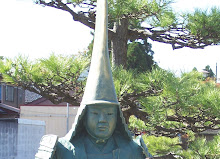In a dramatic move yesterday, Japanese secretary of Labor Kaz Saito said that the Japanese government will pay to send English teachers of Ango-Saxon descent back to their country of origin. The initiative comes as Japan is paying unemployed Brazilians to go back to South America instead of going on welfare.
Details are sketchy, but English teachers who are at least 34% Anglo-Saxon or have an O positive blood type, will receive $3,000 for a plane ticket home. While English teachers haven't lost jobs in the way that Brazilian automotive workers have, the Japanese government is anticipating the eventual abandonment of the whole "learn English project in Japan."
English teachers from Canada, the U.S., Britain and Australia gathered in the streets of Roppongi for a short time, but quickly dispersed and passively retreated to izakayas to have drinking parties and "work off the stress" in an appropriate way.
"I'm in a state of shock," said Bill Jones, 28, from Milltown, Ohio. "In Japan I'm a pretty cool guy and everything, but back home I'm just an unemployed guy who knows nothing about football."
Prime Minister Aso ducked the issue at a press conference, but an anonymous government source said, "It's been admitted that English is a western force that we are sometimes uncomfortable with. Some in the world say we don't speak English very well. This, however, will prove to the world we don't speak English at all!"
Prof. Akihiro from Tokyo University saw the measure as a kind of long-overdue reform in Japanese culture. "In some ways it's a reversal of the whole Commodore Perry phase of Japanese history," he said. "Japan needs to learn more about itself by looking carefully at the Tokugawa period. " He emphasized that the constant fuss about English made the Japanese people feel somewhat inadequate, even nervous.
It's expected that those handful of Japanese people who are still interested in learning English, will have to fly to South Korea or China to find native English speakers and English schools. In contrast to the Japanese, Koreans and Chinese have embraced the idea of learning a lingua franca that gives them a powerful tool for interacting with the world.
"I think you'll find that when the dust settles," said Prof. Akihiro, "Japan will survive without English. You may recall that French was the language of the 18th century, but nobody in Japan knew a word of French then. We were okay just keeping to ourselves, perhaps the world will leave us alone once more."
(The above piece, of course, is satire.)
Saturday, April 4, 2009
Thursday, April 2, 2009
Spring Snow in Japan's Ishikawa Prefecture
Japanese Pay to Send Brazilian Immigrants Home
Of all the countries in the world, Japan is the last country that should be paying anyone to leave their soil. With a declining Japanese population and an increasingly insecure financial future, Japan should be finding a way to keep Brazilians and other South American immigrants in the country, even if they have to have them "on the doll" for a bit.
Japan is now paying to send recently unemployed South Americans of Japanese ancestry back to their country of origin, because they don't want to pay for their social welfare, and its very important to the Japanese that these contract or "temporary" workers get the ax long before any full-time salaried Japanese worker does. Fair enough...Yet this goes right to the heart of Japan's long-term resistance to a racially-integrated society, along with its attempts to maintain a rigid social stability no mater what.
Michael Zielenziger argues in his excellent book Shutting out the Sun that Japan will face a slow and inevitable economic, political and cultural decline if it doesn't take action on the following three items:
Japan is now paying to send recently unemployed South Americans of Japanese ancestry back to their country of origin, because they don't want to pay for their social welfare, and its very important to the Japanese that these contract or "temporary" workers get the ax long before any full-time salaried Japanese worker does. Fair enough...Yet this goes right to the heart of Japan's long-term resistance to a racially-integrated society, along with its attempts to maintain a rigid social stability no mater what.
Michael Zielenziger argues in his excellent book Shutting out the Sun that Japan will face a slow and inevitable economic, political and cultural decline if it doesn't take action on the following three items:
- Open its borders to skilled immigrants who can help increase the sagging population, fill valuable employment vacancies and contribute to the tax base
- Allow foreigners to invest in Japanese companies
- Begin to teach English like you mean it (the way English in Japan is taught is a joke and everybody knows it); Fresh from a recent visit to Japan it seems that the country's English ability is actually in decline right now
Subscribe to:
Comments (Atom)








